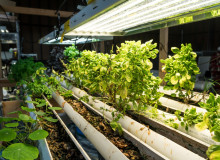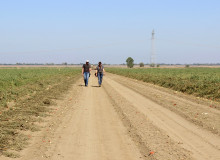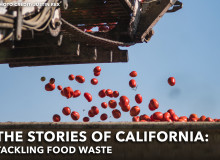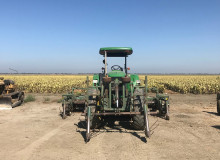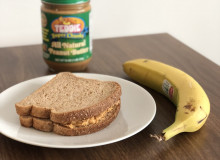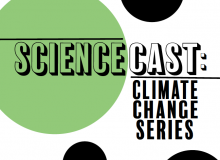sustainable agriculture
Planet Forward Correspondent | University of Wisconsin - Madison
A Madison, Wisconsin-based dream of a hydroponics-driven future: How one student organization hopes to inspire others to embrace clean, sustainable urban agriculture.
Stevenson University
Next in our series: Stevenson University's Quinn Luethy looks deeper into how we're going to feed our planet's growing population. Solutions include the development of crops that can withstand the challenges of climate change.
Planet Forward Senior Correspondent | Cornell University
Next in our Tackling Food Waste series: Any food discussion inevitably involves GMOs. Columbia University's Katherine Baker spoke with an organic farmer and plant pathologist/geneticist to find out more.
Planet Forward
In late summer 2018, 11 students from 11 different universities traveled with Planet Forward to Woodland, California, for a storytelling expedition about food waste reduction.
Eckerd College
In the next story in our Tackling Food Waste series, Eckerd College student Brigit Kenney looks at the broad connection between food production to actually getting that food on our plates. It's a much larger process than she expected to see.
Texas Tech University
Taking a look into making sustainable agriculture practices in California's Central Valley, it's obvious that farmers and seed suppliers have their work cut out for them.
Nebraska's PBS & NPR stations
In Episode 3 of NET’s “On the Table,” NPR’s Dan Charles introduces us to a group of farmers with their noses in the dirt and explains why food companies could soon start labeling their products as soil friendly.
Land O'Lakes, Inc.
Farmers genuinely care about doing their part to protect our planet, for all the same reasons as anyone else. While it’s a worthy sentiment, I believe it’s time to update our message to reflect the changing reality of our industry.
Planet Forward Senior Correspondent | Cornell University
A comparison between 5 meals shows that carbon emissions per calorie varies greatly for certain types of food. Not surprisingly, meat recipes hold the highest carbon-to-calorie ratio.
University of Wisconsin - Madison
In episode five, students discuss sustainable agriculture and how the food we eat impacts the environment.

